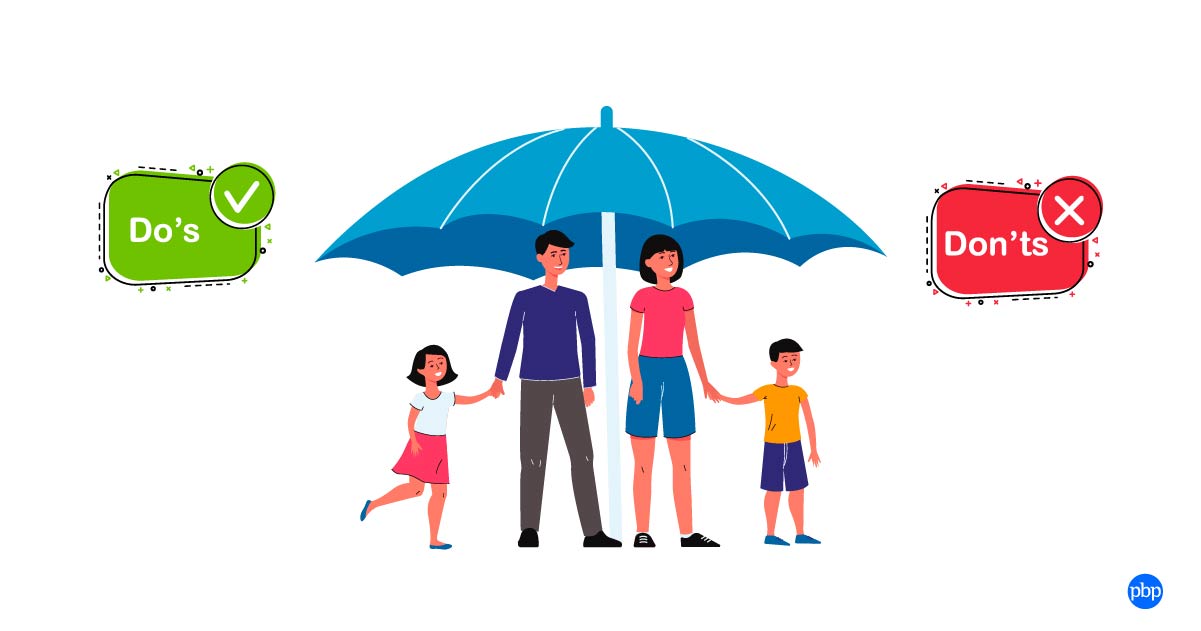Selling life insurance is more than just closing a deal—it’s about providing financial security and peace of mind to your clients. As an insurance advisor, the way you approach the client can make all the difference in building trust and long-term relationships in the world of insurance.
Whether you’re a new agent or a seasoned professional, following the right strategies can help you succeed. Here’s a guide to the dos and don’ts of selling life insurance effectively. By mastering the Do’s and Don’ts, life insurance agents can create a sustainable, client-centric business that drives consistent growth and success.
Do’s of Selling Life Insurance
Understanding of Client’s Needs
Before recommending a Life insurance policy, always take time to understand your client’s financial goals, family responsibilities, and future security. A customized approach increases the likelihood of a sale and client satisfaction.
Educate Instead of Just Selling
Many clients are unaware of the different types of life insurance policies available. Please explain the differences between term, whole, and ULIP plans, along with their benefits. When clients feel informed, they are more likely to trust your recommendations
Build Strong Relationships
Be honest, transparent, and prioritize your client’s needs over your earnings. A satisfied client will not only stay loyal but may also refer new business.
Highlight Key Benefits Clearly
Life insurance is often seen as a long-term commitment. Emphasize important features like tax benefits, financial security, wealth creation, and additional riders that can enhance coverage.
Stay Updated with Industry Trends
The insurance industry is constantly evolving with new policies, regulations, and digital tools. Stay informed about the latest market trends, product offerings, and legal requirements to provide the best service.
Use a Personalized Approach
Every client has unique financial needs. Avoid a one-size-fits-all approach and instead, tailor your sales pitch according to their life stage, income level, and risk appetite.
Provide Excellent Post-Sales Service
Your relationship with a client doesn’t end after the policy is sold. Follow up on renewals, assist with claims, and be available for any concerns. Exceptional service leads to long-term retention and referrals.
Also Read: How to Sell a Life Insurance Policy?
Don’ts of Selling Life Insurance
Don’t Use High-Pressure Sales Tactics
Clients should never feel forced into buying a policy. High-pressure tactics may result in cancellations or negative feedback, which can harm your reputation. Instead, offer solutions and let them make an informed decision.
Don’t Overpromise or Mislead
Be honest about what a policy covers and any limitations it may have. Misleading clients can lead to dissatisfaction, policy cancellations, and legal issues. Transparency is key to long-term success.
Don’t Ignore Policy Comparisons
Not all policies suit every client. Educate them about different options and compare policies based on premium, coverage, riders, and claim settlement ratio to help them make an informed choice.
Don’t Neglect Follow-Ups
Regular follow-ups show that you care about your clients beyond just the initial sale. Reach out to remind them about premium due dates, policy upgrades, and claim processes. A proactive approach fosters loyalty.
Don’t Underestimate the Power of Training
Insurance products and regulations change frequently. Regular training helps you stay ahead in the industry, improves your product knowledge, and enhances your sales skills. Invest in learning to remain competitive.
Also Read: How to Master the Art of Selling Life Insurance Policies Over the Phone?
Final Thoughts
Selling life insurance requires a balance of knowledge, ethics, and client-centric service. By following these do’s and don’ts, you can build trust, increase your sales, and ensure that clients receive the best possible financial protection. Whether you are new to the field or looking to refine your approach, these principles will guide you toward long-term success.
Are you ready to take your life insurance sales to the next level? Start implementing these strategies today and watch your business grow!
Join PBPartners as an insurance advisor and unlock unlimited growth opportunities
FAQs on Selling Life Insurance
What are the basic qualifications required to sell life insurance?
To sell life insurance, you must:
- Must be at least 18 years old
- Minimum Educational requirement: 12th passed
- Pass the IRDAI exam and obtain a life insurance license.
What are the best strategies for selling life insurance?
Successful life insurance sales require understanding your customers’ needs, educating them about the benefits of life coverage, and offering policies that fit their budget. Transparency and trust-building are crucial, along with providing excellent after-sales service to ensure long-term customer retention.
What are the common mistakes to avoid while selling life insurance?
Misleading customers about policy benefits, selling expensive policies just to earn higher commissions, over-promising returns, failing to disclose policy exclusions, and neglecting after-sales service are common mistakes that can harm credibility and customer trust.
How do I handle objections from potential customers?
Objections are common in insurance sales. If a customer says they don’t need life insurance, highlight how it provides financial security for their loved ones. If they find it expensive, suggest an affordable term plan. For those who already have a policy, review their existing coverage to ensure it is adequate. If trust is a concern, educate them on the insurer’s claim settlement ratio and reputation.









